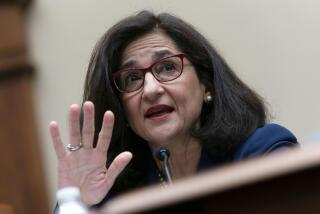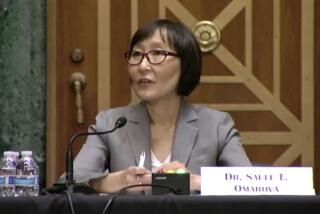Fish Resigns From Columbia Savings
Lawrence K. Fish, president and chief operating officer of embattled Columbia Savings & Loan in Beverly Hills, resigned Thursday after 17 months on the job.
In a telephone interview, Fish, 44, said that he quit voluntarily and that his resignation was not related to the increased scrutiny of Columbia by federal authorities. Officials are looking at Columbia’s close ties to the Drexel Burnham Lambert investment bank and Michael R. Milken, Drexel’s former junk bond head who now is under federal indictment on stock fraud and racketeering charges.
Fish also said his resignation had nothing to do with the recent passage of federal laws that will force the thrift to get rid of its its huge, $4 billion portfolio of high-yield, high-risk junk bonds within five years. In the future, Columbia and other thrifts will have to invest in junk bonds through separately capitalized affiliates and will no longer be allowed to buy them using money from their depositors.
Both Fish and Columbia, in effect, said Thursday that Fish had eliminated his own job. Fish headed up a reorganization and decentralization of Columbia in which his duties were divided up among other managers. In a statement, Columbia said the plan “effectively eliminated the function of an overall corporate chief operating officer.”
Speculation Sparked
Thrift executives and consultants said they were surprised by Fish’s resignation, if for no other reason than that he was so well paid. Columbia’s most recent proxy statement showed his annual compensation as a $384,893 salary and a $1.5 million bonus. The statement also lists 133,000 shares that he may acquire by exercising options, worth about $1.3 million now.
Fish said he plans to spend time with his family and that he has not started looking for another job.
Despite his denials, some observers speculated that Fish’s resignation was sparked by the passage of the federal savings and loan bailout bill last week. Because the bill will force Columbia to change the direction of its investments, they said Fish may feel that he would be bored running a conventional thrift operation.
Family-Owned Business
“He may have felt his wings were clipped and may not feel like he’s a traditional savings and loan guy,” said one Los Angeles thrift executive, who spoke under the condition he not be identified.
The executive also speculated that Fish may have found it difficult to work at a family-controlled thrift such as Columbia, which is controlled by the Spiegel family.
A former executive at Bank of Boston, Fish was hired in March, 1988, at Columbia and ranked second there to Thomas Spiegel, 43, the thrift’s chief executive. Fish was in charge of Columbia’s thrift unit while Spiegel continued to run Columbia’s investments in junk bonds and mortgage-backed securities.
Fish, who plans to stay on until Sept. 30, said he told Spiegel earlier this week that he was quitting, adding that he began considering the move two months ago. He said that he is leaving on good terms with Spiegel.
“This is a very amiable and, I hope, a professional kind of departure,” he said.
Spiegel was not available for comment but released a statement praising Fish and saying that he is looking for a successor to run Columbia’s thrift operation.
More to Read
Inside the business of entertainment
The Wide Shot brings you news, analysis and insights on everything from streaming wars to production — and what it all means for the future.
You may occasionally receive promotional content from the Los Angeles Times.









